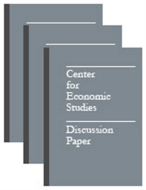The Impact of Manufacturing Credentials on Earnings and the Probability of Employment
The Impact of Manufacturing Credentials on Earnings and the Probability of Employment
Abstract
This paper examines the labor market returns to earning industry-certified credentials in the manufacturing sector. Specifically, we are interested in estimating the impact of a manufacturing credential on wages, probability of employment, and probability of employment specifically in the manufacturing sector post credential attainment. We link students who earned manufacturing credentials to their enrollment and completion records, and then further link them to their IRS tax records for earnings and employment (Form W2 and 1040) and to the American Community Survey and decennial census for demographic information. We present earnings trajectories for workers with credentials by type of credential, industry of employment, age, race and ethnicity, gender, and state. To obtain a more causal estimate of the impact of a credential on earnings, we implement a coarsened exact matching strategy to compare outcomes between otherwise similar people with and without a manufacturing credential. We find that the attainment of a manufacturing industry credential is associated with higher earnings and a higher likelihood of labor market participation when we compare attainers to a group of non-attainers who are otherwise similar.
Others in Series
Working Paper
Working Paper
Working Paper




